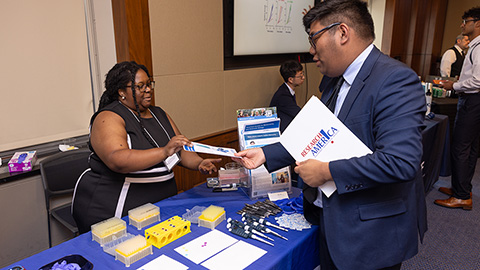ASBMB calls for better wages and benefits for postdocs
The American Society for Biochemistry and Molecular Biology sent recommendations to the National Institutes of Health on April 14 to improve working conditions for postdocs.
The society recommended that the NIH:-
Ensure a livable wage, benefits, etc. for postdocs
-
Require that principle investigators help postdocs craft a training plan
-
Require that principal investigators complete mentor training programs
-
Expand programs to create more academic staff scientist positions
-
Collect data on postdoc career outcomes
“Many of our members who run labs are struggling to recruit and retain qualified postdocs,” Sarina Neote, public affairs director of the ASBMB, said. “We are glad the NIH asked for the community’s input, and we hope it will lead to better treatment of postdocs, who are a critical part of the American scientific enterprise.”
The ASBMB’s statement comes during what some in academia are calling a “postdoc shortage.” A survey by Science magazine found that three-quarters of principal investigators reported challenges recruiting qualified postdoc candidates. Furthermore, a Nature survey revealed that postdocs experience great distress with their workload and workplace culture.
Postdocs are often underpaid, leading them to struggle to meet their basic needs, such as housing and medical expenses. The ASBMB claimed that challenges such as these and lack of health insurance, childcare access and childcare funds, retirement plans and more can make postdocs feel isolated and threaten their quality of life. The society urged NIH to provide more basic benefits as well as resources to support mental health.
“Mitigating a few of these challenges would go a long way in increasing recruitment, retention and quality of life for postdoctoral researchers,” the society wrote.
In addition, becoming an academic principal investigator requires enormous sacrifices such as time away from family and constantly searching for funding, which some postdocs are not willing to bear.
“Graduate students and postdocs observe their advisers and peers struggling and become increasingly unwilling to pay the opportunity cost required to secure faculty positions that are outrageously competitive and have few perks in comparison to the challenges,” the society wrote.
Due to the temporary nature of a postdoc position, postdocs are often overworked in the laboratory without clear goals or time for professional development. “NIH should require postdoctoral training plans that detail anticipated timelines for publications, grant submissions and other milestones, and agreed upon percent effort between professional development, mentored research, and independent research,” the ASBMB wrote
However, this requirement may present a challenge for many principal investigators because they are not formally trained in mentoring. The ASBMB recommended that principal investigators undergo formal mentorship training to be eligible for NIH grants in order to help them develop training plans with their postdocs.
As the number of students earning Ph.D. degrees increases, many postdocs who want to stay in academia fail to find all types of academic positions after completing their training. The ASBMB suggested that NIH expand programs such as the National Cancer Institute’s R50 Research Specialist Award to all institutions in order to provide more academic positions for qualified researchers such as staff scientist jobs.
The society also said that pursuing an academic postdoc often does not lead to increased career trajectory or salary.
“The value of pursuing a postdoc for nonacademic careers is not well quantified.” The society encouraged the NIH to collect and disseminate data on career outcomes, such as salary and position level, of graduate students as well as postdocs to help them make informed career decisions.
Enjoy reading ASBMB Today?
Become a member to receive the print edition four times a year and the digital edition monthly.
Learn moreGet the latest from ASBMB Today
Enter your email address, and we’ll send you a weekly email with recent articles, interviews and more.
Latest in Policy
Policy highlights or most popular articles

Embrace your neurodivergence and flourish in college
This guide offers practical advice on setting yourself up for success — learn how to leverage campus resources, work with professors and embrace your strengths.

ASBMB honors Lawrence Tabak with public service award
He will deliver prerecorded remarks at the 2025 ASBMB Annual Meeting in Chicago.

Summer internships in an unpredictable funding environment
With the National Institutes of Health and other institutions canceling summer programs, many students are left scrambling for alternatives. If your program has been canceled or delayed, consider applying for other opportunities or taking a course.

Black excellence in biotech: Shaping the future of an industry
This Black History Month, we highlight the impact of DEI initiatives, trailblazing scientists and industry leaders working to create a more inclusive and scientific community. Discover how you can be part of the movement.

ASBMB releases statement on sustaining U.S. scientific leadership
The society encourages the executive and legislative branches of the U.S. government to continue their support of the nation’s leadership in science.

ASBMB and advocacy: What we accomplished in 2024
PAAC members met with policymakers to advocate for basic scientific research, connected some fellow members with funding opportunities and trained others to advocate for science.

